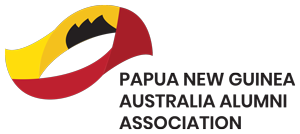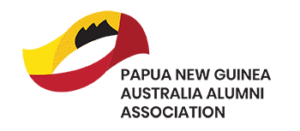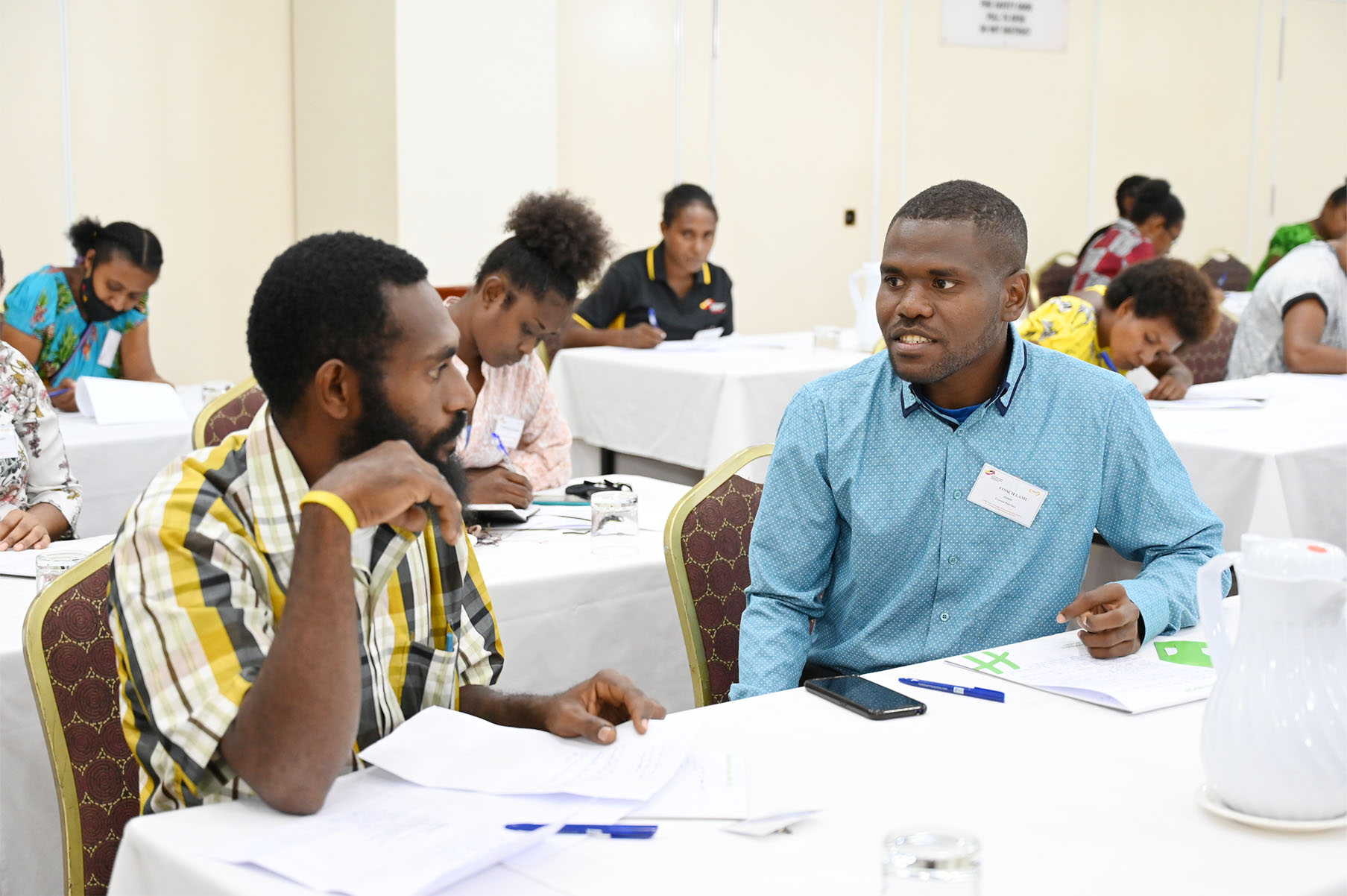
5 Oct, 2022 | News
World Teacher’s Day gives us an opportunity to recognise the hard work and commitment of our educators. This year’s theme is ‘the transformation of education begins with teachers’.
Finsch Lamu graduated from a Post Graduate Diploma in Education through Australia Awards PNG earlier this year and is now teaching at Sacred Heart Tapini Secondary School in Goilala District. While he says that his heart lies in rural areas, he didn’t expect the remoteness of Tapini which is only accessible by small airplane.
“The view from above was fantastic, all you can see is mountainous terrain, meandering rivers and green vegetation. When we landed at Tapini Airstrip, I walked out of the plane and was blown away by how cold the place was. It felt like I was somewhere up in the highland regions of PNG.”
Creating lesson plans for five different classes proved to be Finsch’s greatest challenge as a new teacher. There is no internet connection at the school and he had to turn to his colleagues for support. “Your relationships with senior teachers are very important. In a new school far from home these are the only people you can rely on.”
Finsch believes that “teaching is more than standing in front of a classroom and talking to students. It’s about imparting knowledge, skills and values that students remember for a long time.”
He takes his lesson planning very seriously and in the short time as a teacher, has discovered some innovative ways to help his students remember their content.
“I found out that in order to achieve, a teacher must target all the senses. When I teach about reptiles, I bring an actual snake into class so students can see, feel, smell and hear the animal and that’s how students remember for a long time. That is also the reason you remember a movie compared to a math formula.”
Finsch believes that education is about shaping the future. If all stakeholders in PNG work together including government, teachers and parents, the standard of living can be improved for all. He plans to develop his secondary school teaching skills and one day teach in tertiary institutions.
“If you can write or even if you are reading this, someone in the past has sacrificed his/her time and life to help you become who you are now.
“Teachers are like a scope, magnifying dreams of students and pointing them in the right direction. That’s why I chose the noble profession of teaching. As a guide to students in the right path towards successful career and also in life. This contributes to our human resource which is the heart of our economy. In general, when I teach students, I am building human capital which in turn develops the economy and improves our nation.”
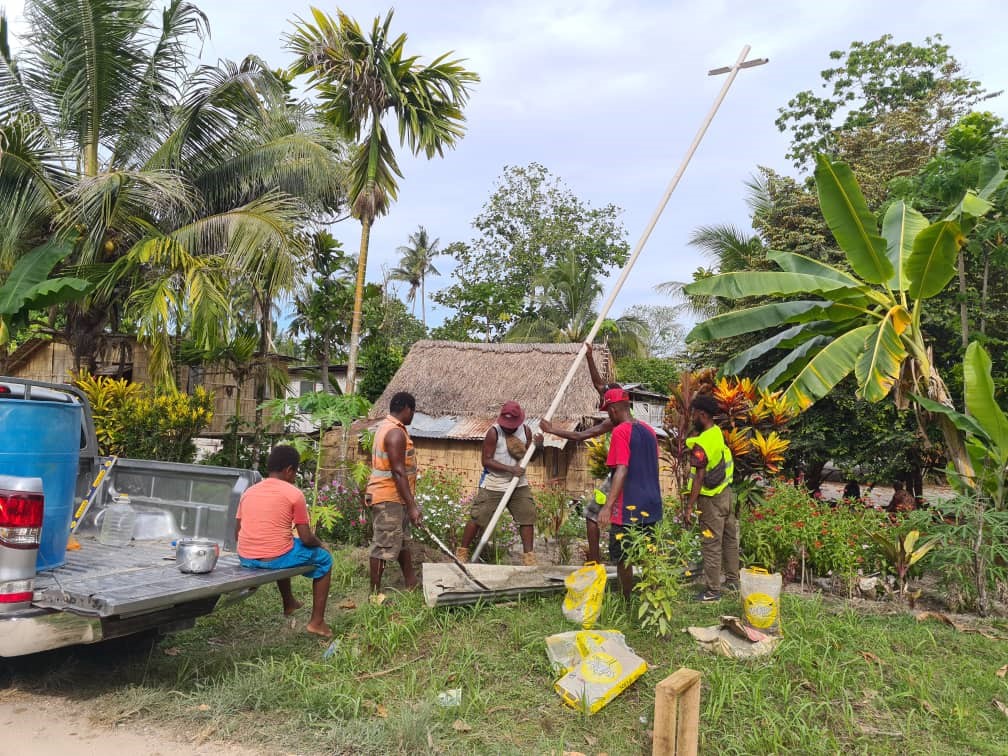
4 Oct, 2022 | News
The villages along Ward 7 in Matalai, Namatanai District of New Ireland province were hotspots for vehicle theft and vandalism. Youth under the influence of alcohol and drugs hung around the roadside and occasionally harassed the public.
Iola Tamtu, an Australia Awards PNG alumni from Matalai, observed that most criminal activities occurred at night when perpetrators used the cover of darkness for their unwarranted activities.
Iola thought the installation of streetlights along those dark areas would have a greater level of security. Applying for an Australia Awards PNG alumni grant, Iola proposed the supply and installation of 21 solar streetlights along Ward 7.
Her grant was approved and in 2021 and she managed a local team to erect 20 solar streetlights along Ward 7 and one streetlight at the Australian war memorial in Kavieng town. She explained that placing a streetlight at the memorial was an expression of her people’s gratitude to the Australian Government for supporting the Matalai solar light project.
Iola reports a decrease in harassment and vandalism since. Vehicle owners now commute after sunset with less anxiety about their safety. Pedestrians are seen walking the roads at night and the community is happy to have solar lights.
Aligned with the New Ireland Government’s development goals and their Lighting New Ireland subsidy policy, Iola’s project promotes sustainable energy sources, cost effective delivery and environmentally friendly infrastructure development solutions in the province.
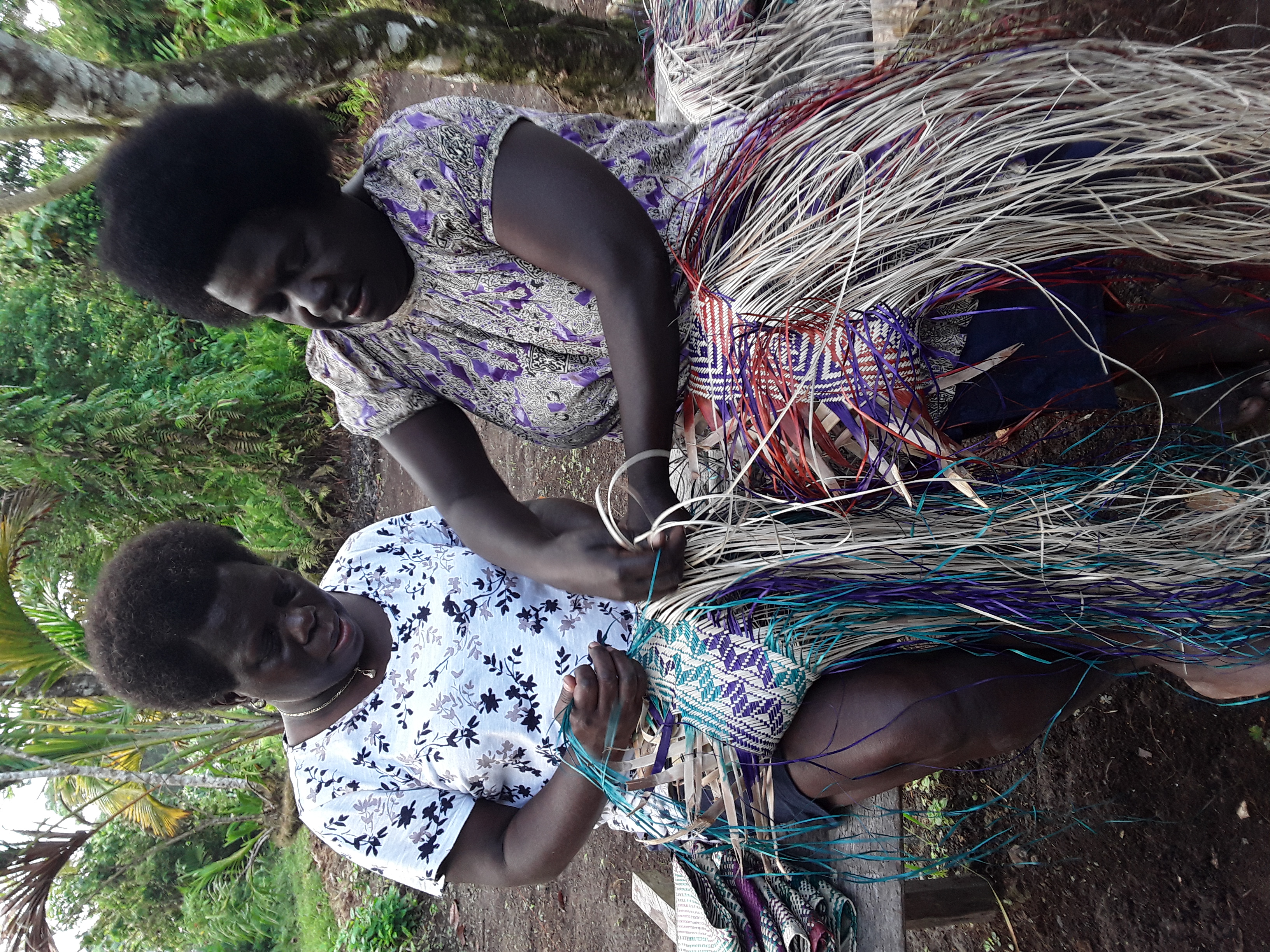
15 Jun, 2022 | AROB, News
Through her small business venture Anku Crafts, Anne Iauku is supporting rural communities in her home province of Bougainville through the trade of eco-friendly handmade crafts. The travel is also giving her an opportunity to re-connect and she is happy to see traditional harvesting and weaving practices being nurtured.
“A combination of interest in handicraft and culture, and particularly the desire to help my people in villages in Siwai District, South Bougainville market their unique handmade products got me into my small business.
“Rather than sending money to relatives, which encourages a free handout mentally, I believe in changing mindsets, and engaging village communities in more rewarding and continuous income earning habits.
“The attitude to work hard and commit to supporting community welfare was learnt at an early age from my parents. They were hardworking, committed to ensuring there was happiness and welfare for our extended families and communities around us.”
Anne graduated with a Higher School Certificate in 1992 from the Glennie School, Toowoomba. She started buying from just a few family members in 2018, and within a few months expanded her business to include several villages in the Siwai District. She now also visits the Bana District where she had never been before. The crafts include bilums, baskets, bags, hats, trays, bowls, hot pot mats and coasters. They are made out of raw materials including tree bark, wild bananas, vines, canes, bamboos, coconut and pandanus leaves, just to name a few. The raw materials require harvesting, gathering, careful shredding and drying before weaving into finished products.
“It gives me great personal satisfaction to be an active participant in my community. When I am in the village weavers tell me their personal stories of how they use the funds to pay school fees, pay hospital clinic visits and those really touch me. If I can help, parents give their children a brighter future, others regain their health; buy basic needs, it is satisfying for me.
“When I started my career, I did not travel home regularly, as it is quite expensive. Throughout those years, there was a sense of disconnection. I travel home frequently now, with the buying activities. I am interacting, bonding and I feel 100% with the community.
“Another rewarding observation is that weavers are passing weaving skills and knowledge to the young. These skills and knowledge and good culture need to be harnessed and kept alive for future generations.”
The craft business is as challenging as it is rewarding. The crafts travel six hours by unsealed road to Buka, a few minutes by boat across the Buka passage then eighty minutes by plane to Port Moresby. Coordination with limited access to mobile networks keeps Anne very busy on top of her full-time job in Port Moresby, which she is also passionate about.
“I am a Professional Development Trainer and I absolutely love what I do and give it 100 percent. Being an SME owner is my second job and I commit to it after work hours and on weekends.
“My job skills and knowledge and the skills and knowledge I require to run my SME complement each other. It requires many skills including excellent time management, planning and organising, communication, customer care and people skills. As a trainer, I deliver professional development and leadership courses. I have better workplace skills and practices now because of having to balance my job, my SME and personal life.”
Anne takes advantage of the many PNG Australia Alumni Association (PNGAAA) professional development opportunities available to members to keep on top of her game.
“I am grateful to PNGAAA for the opportunities to attend seminars that are always refreshing and motivational. The experts sharing information and practices help me to reflect on my own practices and experiences. Recent seminars on writing proposals, marketing, communicating and storytelling are empowering me to set goals and action plans both professionally and for my SME and community activities. I continue to network within PNGAAA. I am excited about the next five years.”
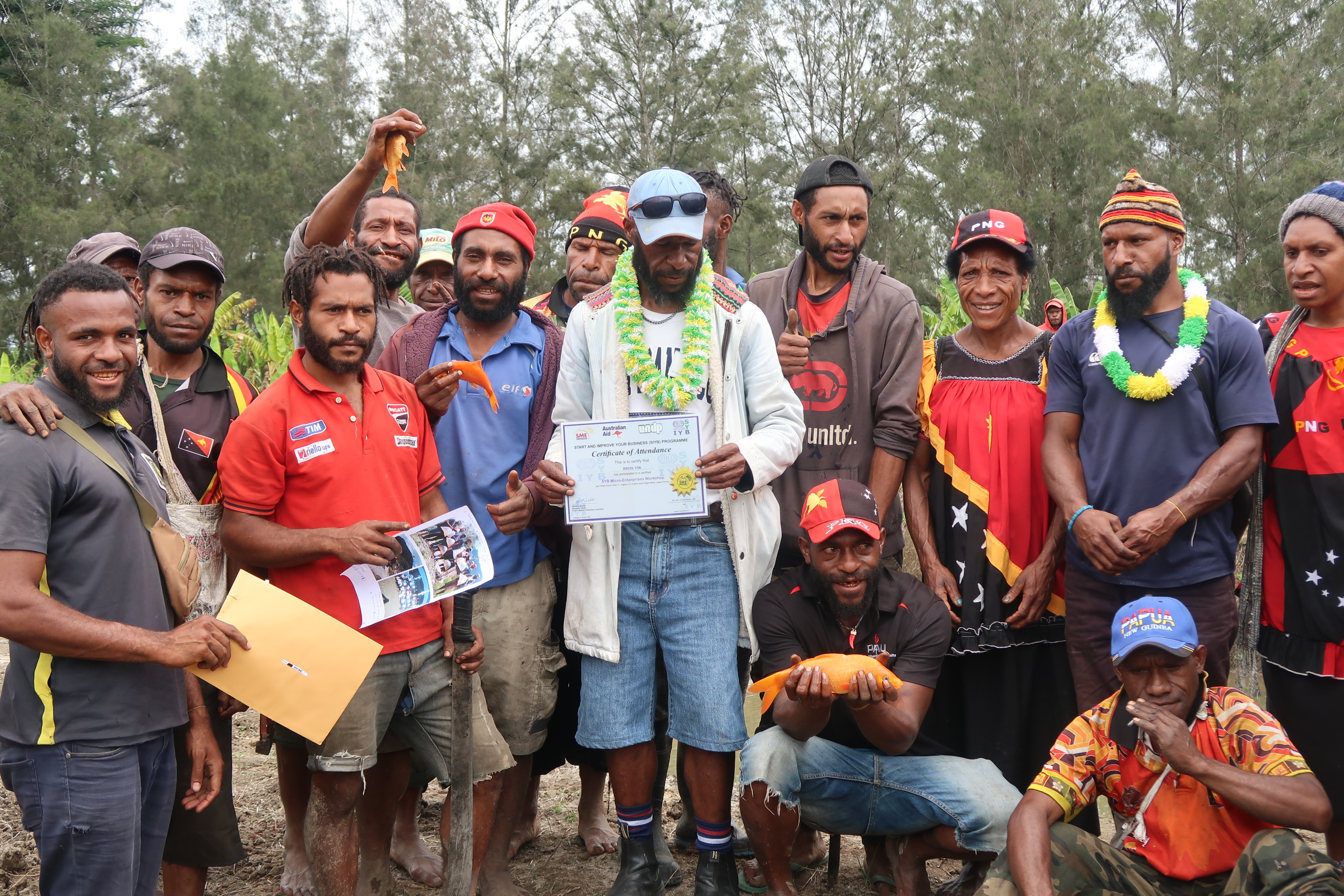
24 May, 2022 | News, Western Highlands
Fifty people (including 15 females and three PLWD) in Mt. Ogga a rural remote community in Western Highlands province attended five days training on fish farming facilitated by Australia Awards alumnus local resident Brian Yak. Participants acquired new skills and knowledge on fish farming.
Brian completed a Short Course in Agribusiness from the University of New England, graduating with a Certificate IV in 2018. He used the knowledge and skills gained from his study in Australia to facilitate the training and encourages fish farmers to open businesses. “Since the project ended last year, there has been continued interest from youths in the community to join the Mt. Ogga Cooperative Society and raise fish to improve their livelihoods.”
With the aim of improving the livelihood and food security of his local community, Brian successfully applied for K30,000 Australia Awards grant from the alumni grants scheme to enhance fish production and food security of the Mt. Ogga people.
The fifty participants have not only learnt new skills and knowledge but transformed their way of living. A participant, Joseph Abel said “before this fish farming project, I was involved in petty crimes. But when Brian approached the community about this project, I saw this as an opportunity to change. This project was a blessing to me. I’ve grown spiritually and went to church for the first time in August 2021.”
Participant Sabina Poles added: “Before the fish farming project, women were involved in gambling, but this has changed since the inception of the project. Women are now actively supporting their husbands who are members of the Cooperative Society. This has become a shared family responsibility.”
The fish farming project has built capacity of the Mt. Ogga Cooperative Society members and enabled them to understand the dynamics of fish farming.
With their newly acquired skills and knowledge, community members were able to increase production, improve marketing and manage fish production better. Fish farmed include Carp and Tilapia species. Production exists from fingerling or offspring raised within the ponds.
“This project has the potential to transform to a commercial level and I see this happening in the near future,” declared Brian.
The project is consistent with the development priorities of the agriculture and economic sector of the Papua New Guinea Development Strategic Plan 2010-2030 and Vision 2050, on the key pillars of human development, institutional development, and wealth creation. With the pressure of a fast-growing population, this project helps provide food security particularly to vulnerable groups such as children, people with disability and those living with HIV/AIDS.
Two successful outcomes of the training included fingerlings distributed to each family member of the training attendees which resulted in the creation of family fishponds. Brian has agreed that aquaculture is key to development. Potential challenges include lack of access to affordable fish feed and quality fish seed among small-scale farmers.
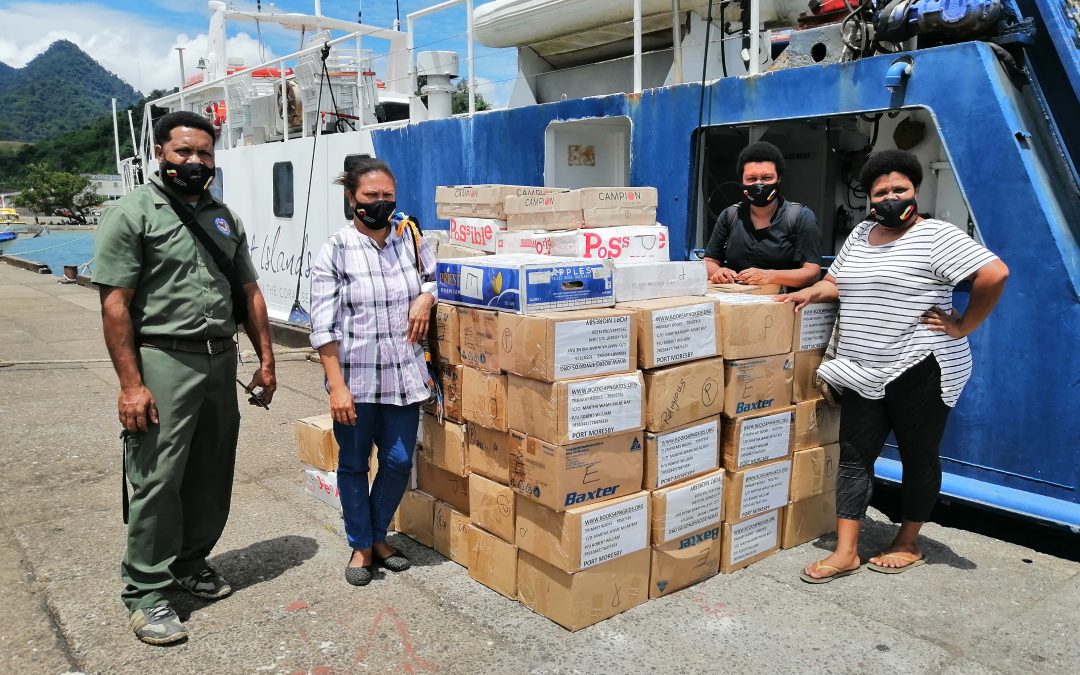
8 Nov, 2021 | Milne Bay, News
Papua New Guinea (PNG) has one of the lowest literacy rates in the Pacific which has been a cause for concern for many years.
Recognising this challenge, the Papua New Guinea Australia Alumni Association’s (PNGAAA) Milne Bay Chapter took the initiative to assist school-aged children in remote areas in Milne Bay Province by providing basic reading books.
Since the inception of the Chapter in 2018, hundreds of library books have been distributed to over 40 rural elementary and primary schools through the ‘ship-to-shelf’ initiative in Milne Bay. Distribution was halted in 2020 due to COVID-19 and recommenced this year thanks to PNGAAA and Books 4 PNG Kids, a Brisbane based book collection organisation.
The latest donation in early October saw close to 143 boxes of junior fiction books distributed to ten mountain and coastal schools in the Weraura Local Level Government (LLG) in Alotau District. The donated library books were shipped to Port Moresby at the expense of Books 4 PNG Kids then transported to Alotau with the assistance of the Conflict Island Resort through the MV Undersea Explorer.
The Chapter applied for K23,000 under the PNGAAA Alumni Grants Scheme to assist with storage and transportation of the books throughout Milne Bay and the neighbouring provinces. Unloading hundreds of boxes and sorting them for the respective schools can be laborious but alumni happily volunteered their time and efforts.
“Our dream is to reach every local level government in the province, targeting very rural and remote communities which have not been supported previously. We also aim to maintain our book depot through the Alumni Grants Scheme to cater for more storage space as we plan to reach the border provinces as well,” said Milne Bay Chapter President Dickson Kenas.
“This book initiative has greatly improved the reading and writing skills of students. One of our female students from Agaun Primary School in the Daga LLG topped Milne Bay Province in the Grade 8 National English Exams in 2020 scoring 43 out of 50,” said Agaun Primary School Senior Teacher Lavenda Boredi.
Retired public servants and senior citizens are using the book initiative to encourage places of learning through cultural exhibitions and crafts.
“We hope that community resource centres will be built in every ward and village in Milne Bay through this initiative where learning and reading has been lost over the years,” said Chapter Secretary and Book Coordinator Martha Wame.
One recipient is a blind woman who organises books for elementary students at schools in her ward. Another recipient, a retired couple, shares books with children with special needs children who cannot attend school on their island community due to the unavailability of a special needs teacher.
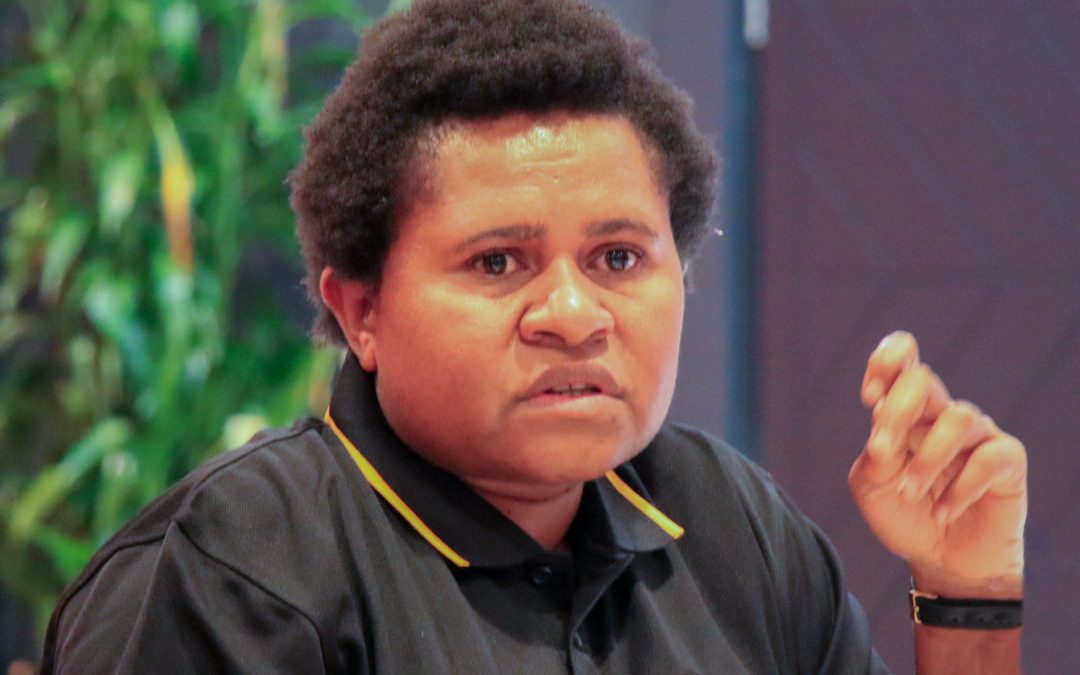
5 Oct, 2021 | News, Western Highlands
Ensuring health messaging reaches beyond urban areas to rural and remote PNG is crucial to an inclusive COVID-19 response, as Emma Minimbi knows well.
The Australia Awards alumna is going above and beyond her legal aid work in Jiwaka province to make sure rural communities are well informed about COVID-19 and the benefits of vaccination.
“The first thing I did when I returned to my village in Jiwaka province was tell community people at the local market that I had just received my first dose of the COVID-19 vaccine,” Emma explains.
“I further told them that it’s free and I feel no different than I did before getting vaccinated.”
Having completed a Master’s in law at The University of Melbourne, Emma says she is more aware than ever of the need to share experiences across PNG in the shared fight against COVID-19.
“Papua New Guineans who are educated and know the importance of being vaccinated should lead by example and educate their rural communities,” she says.
“If we want to encourage mass vaccinations, we need to take the first step in getting vaccinated ourselves.”
Emma has also distributed face masks to villagers in Jiwaka and is actively encouraging good hand hygiene.
“I’ve also advised people with flu like symptoms to isolate themselves in their homes and refrain from coming into contact with other people until the symptoms subside,” she says.
Emma acknowledges there is some way to go as the vaccination rollout continues but says the early results of her advocacy are encouraging.
“Ten people in my community have decided to go get vaccinated so I will be taking them to Western Highlands Provincial Health Authority’s office in Mt Hagen to get vaccinated,” she says.
“I’m excited that rural people are now responding to the global pandemic that COVID is and making the conscious decision to get vaccinated.”
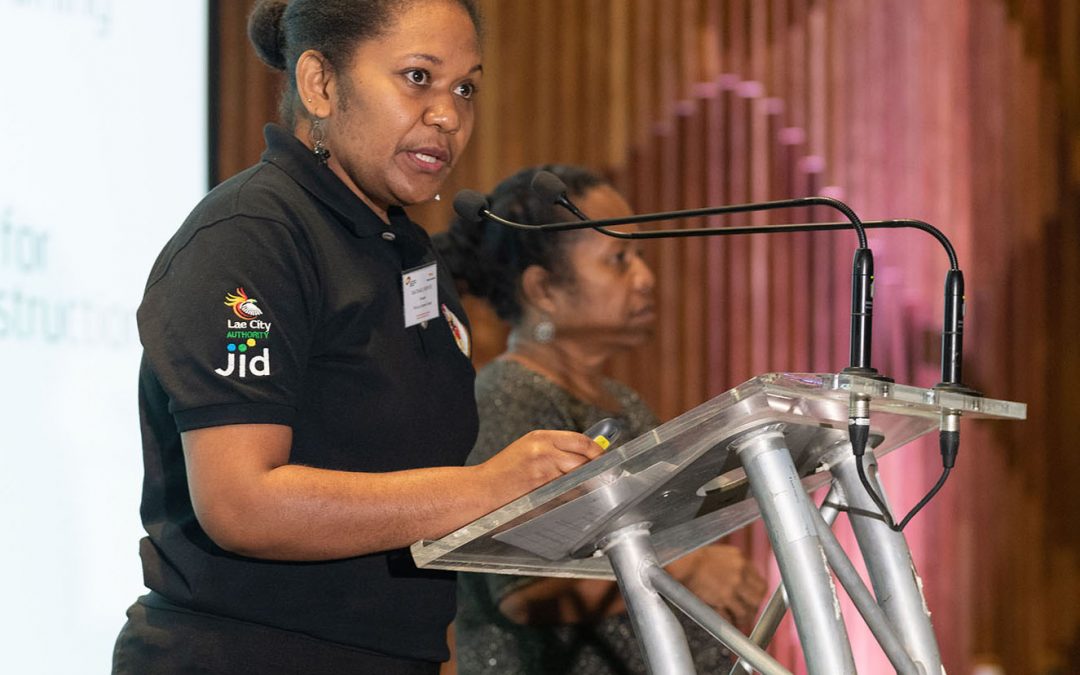
29 Sep, 2021 | News
The Papua New Guinea Australia Alumni Association (PNGAAA) hosted its biennial conference on 28 September, providing 22 alumni a platform to share their strategic views on how best Papua New Guinea (PNG) can rebuild, strengthen, and persevere as a country.
Under the overall theme ‘Leadership and Innovation in Papua New Guinea’s New Normal’, 22 alumni presented on their capacity to address the challenges of COVID-19 across key sectors in PNG and introduced important domestic solutions for the country’s social and economic recovery.
The conference, which also involved representatives from Government, private sector, civil society and development partners, saw two types of presentations: lightning presentations – a quick overview of an alumni’s innovative idea or actual initiative in addressing the challenges in PNG’s new normal, and full presentations – a proposal or actual initiative addressing challenges in PNG’s new normal.
High-level attendees included Australian Deputy High Commissioner Mr Paul Lehmann, Secretary for Department of National Planning and Monitoring Mr Koney Samuel and other senior representatives from the private sector.
Mr Lehmann in his keynote address reinforced the commitment by Australia to support PNG tackle this urgent challenge. He said “COVID-19 has had a profound impact on our lives. However, in many ways, it has strengthened the partnership between PNG and Australia as we continue to work closely together to emerge from this crisis.”
Alumna Brenda Andrias – who achieved her master’s in public policy on an Australia Awards scholarship – presented on her work with UN Women on social protection and women’s economic empowerment during COVID-19.
“I hope that my presentation will garner support from relevant PNG Government agencies at a policy level to look at developing local economies and invest in promoting the growth and transition of those in the informal to the formal economy,” said Brenda.
Guest speaker from Australia’s Northern Territory, Cultural and Community Engagement Manager of Cultural College, Ms Djapirri Mununggirritj, spoke about health and educational challenges faced by indigenous Australians during COVID-19 and how they have overcome those challenges.
The alumni conference held biennially showcases the impact of alumni’s efforts in contributing to the growth and development of PNG in their various sectors whilst maintaining the people-to-people links with Australia.
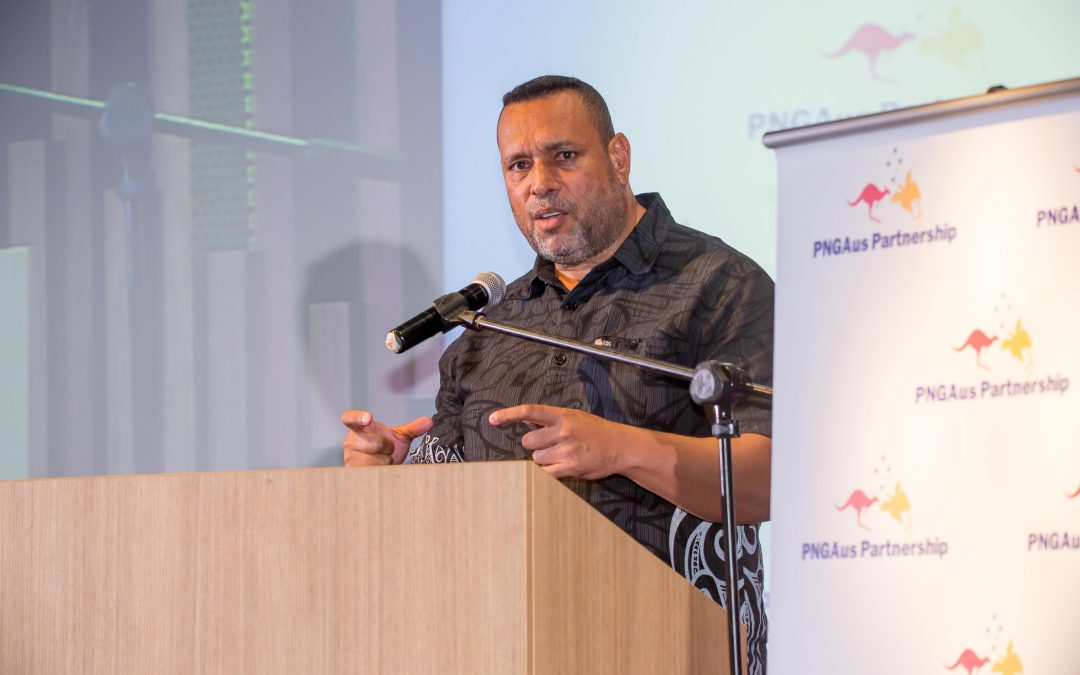
16 Feb, 2021 | News
The Papua New Guinea Australia Alumni Association (PNGAAA) held a virtual networking dinner on Thursday, 11 February 2021 at the Hilton Hotel, Port Moresby, and around PNG, to celebrate the achievements of alumni in 2020 and recognise outstanding alumni who have made significant contributions to their profession, community and country through their exemplary leadership, integrity, innovation and hard work.
Governor of East Sepik Province, the Hon. Allan Bird MP, and Australian High Commissioner to Papua New Guinea, His Excellency Jon Philp, both spoke at the event, reinforcing the PNGAus Partnership’s commitment to sustainable development and shared prosperity. In his keynote address, Governor Bird, urged alumni to make the most of their “rare and special” position as highly educated Papua New Guineans and give back to their communities and nation.
PNGAAA President Dr Rangou encouraged alumni to build on their success during a challenging 2020 and make even stronger contributions in the coming year. “2021 is the year to bring about possibilities. Unleash your potential and be the change that you want to be,” she said.
The event also saw five high-achieving alumni awarded PNG-Australia Alumni Awards. The Awards recognise excellence in fields including innovation and entrepreneurship, women in leadership and community service.
The winner of the Alumni of the Year Award was Dr Deane Woruba, a pioneering agricultural scientist from East Sepik. Dr Woruba was recognised for his ground-breaking agricultural research and his contributions to community development in his home province.
The virtual networking dinner connected 11 PNGAAA Provincial Chapters across the country including: National Capital District, Autonomous Region of Bougainville, Manus, East New Britain, Morobe, East Sepik, Madang, Enga, Eastern Highlands, Western Highlands and Milne Bay. The theme Innovative Solutions for Alumni Engagement in the New Normal was in focus during the dinner with over 200 members attending physically and virtually.
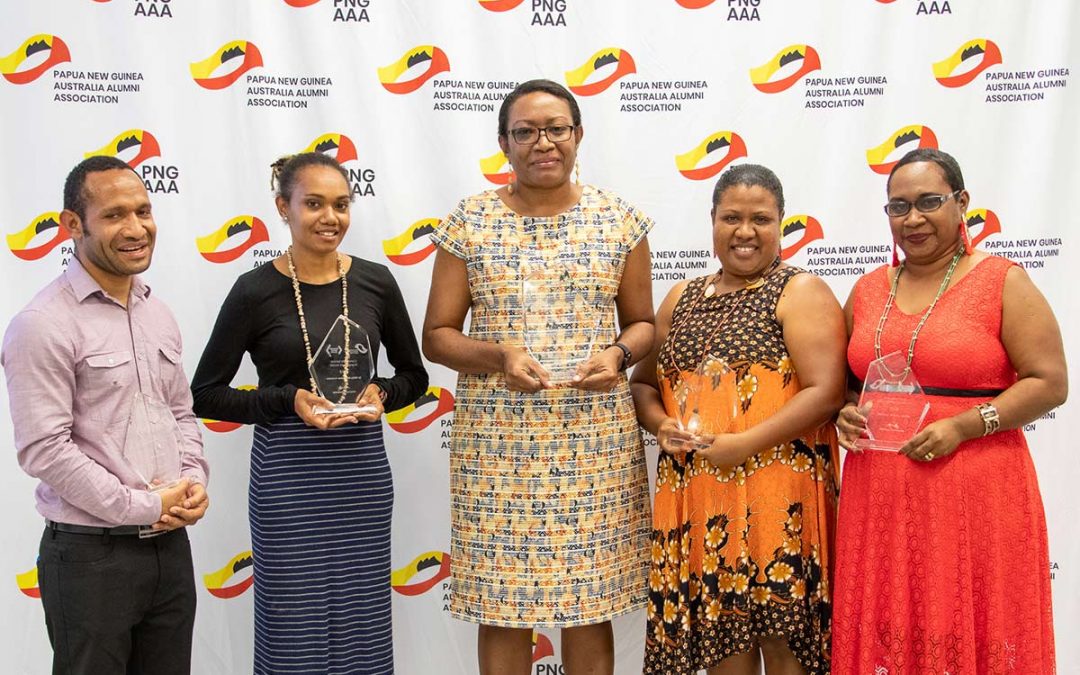
7 May, 2020 | News
The 2020 PNG-Australia Alumni Awards recognise and honour Papua New Guinean alumni who have studied in Australia and made oustanding contributions to their profession, community and country through their exemplary leadership, integrity, innovation and hard work. Supported by the Australian High Commission in PNG, the awards are distinguished honours for alumni who are an inspiration in their local, national and international network and achievements.
Nominations have been extended to Friday, 16 October 2020. To find out more about the Award categories and eligibility, download the factsheet and to nominate an outstanding alumni download the nomination form.

